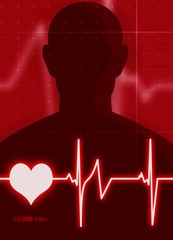
Everyone at one time or the other has experienced their heart skip a beat. But experts, in this report by SADE OGUNTOLA, warn that for some people, it can be serious when it persists.
If your heart skips a beat it could be love, but it could also be a disease. Heart palpitations, which feel like a skipped beat or racing heart, in fact, might be a warning sign of heart disease or stroke. Unfortunately, many people are not paying attention to their heartbeat.
Individuals notice their heartbeats in different ways. Some people feel their heartbeat once-in-a-blue-moon and others do so dozens a day.
Some people notice their heartbeat when they are drifting off to sleep; standing up after bending over. Other people feel their heart sometimes is pounding after taking too much coffee or alcohol, stress, anxiety, panic or during strenuous exercises and physical activity.
Irregular heartbeats, what is medically called palpitations or heart arrhythmias, Dr Okechukwu Ogah, a consultant physician and cardiologist at the University College Hospital (UCH), Ibadan, said should not be overlooked, especially when it is persistent.
According to him, an improper beating of the heart, whether irregular, too fast or too slow, when persistent could be due to a structural damage in the heart or even a problem elsewhere in the body.
“The heart can be seen as a muscle and can also be seen as a bundle of wire. So once you have a crack in the wire, supplying light to your house, it will be sparking. So, the same thing happens within the body.
“If there is an injury in the heart also either because of heart attack, high blood pressure or whatever, this could occur. Also, it could be present at birth. And since already the wiring of the heart has a problem and it can go irregular at any point in time.”
Basically, the heart should work in a regular manner. Once it is irregular, this can cause blood to pool in the heart, and blood clots can form in this pooled blood.
According to Dr Ogah, the blood clot can be transported to the brain and other organs in the body, where it may end up doing a lot of damage.
“It can even go back to the heart again through the blood vessels supplying the heart where it can cause a heart attack. If it is the lung, pulmonary embolism may result. If it is the brain, it can lead to stroke.
“It can also block the blood vessels supplying the legs, and as such the affected person could have gangrene of the legs. It can also damage the kidney. In fact, the damage can be anywhere in the body. In fact, some of the gangrenous legs are not due to diabetes, but blood clot blocking the passage of blood to legs.”
Gangrene happens when a lack of oxygen-rich blood causes tissue to die in some parts of the body, often the hands or feet. It is a serious condition that can result in amputation of a limb or death. It needs urgent treatment to halt the spread of tissue death as rapidly as possible.
However, Dr Ogah said that not all irregular heartbeats can be felt, adding that episodes of atrial fibrillation, a type of irregular and often racing heart rate, often has no symptoms.
Other types of irregular heartbeats include Bradycardia, a condition wherein an individual has a slow heart rate and tachyarrhythmia, a condition when the heart rate is faster-than-normal heart rate.
But the commonest sign of atrial fibrillation is an irregular heartbeat. Other symptoms may include irregular pulse, shortness of breath, tiredness, chest pain, fatigue, dizziness and even loss of consciousness.
Dr Ogah said that atrial fibrillation is very common in elderly people and males, with experts seeing between two and three new cases weekly in many hospitals.
Although atrial fibrillation is common all over the world, he said a study is presently being done to ascertain things that predispose Nigerians to this form of an irregular heartbeat as well as deaths as a result.
The expert, however, said although a person may experience a skipped heartbeat, it may not be as a result of atrial fibrillation, adding that the irregular or rapid heart rate must be persistent before it could be termed atrial fibrillation.
“Preferably a cardiologist who will run an electrocardiogram (ECG) to ensure that it is atrial fibrillation. So when you feel that your heart is not working as it should see the doctor to confirm what it is and that he should it treats it appropriately to prevent its complications. For instance, the risk of death from it is high, especially from stroke.
“People in Africa with atrial fibrillation are not doing well. Deaths from it in Africa are high because our patients are not properly taking care of to ensure the rate and speed of irregular heartbeats is controlled. They are not taking anti-coagulants so that even if there is a blood clot forming, it will thin it out and prevent the blockage of the blood vessel,” he declared.
Sadly, the irregular heartbeat may have wide-ranging effects in the body. Experts in a meta-analysis of its implication said the condition also increases a person’s risk for complications such as heart failure, kidney disease and dying of heart disease.
In the 2016 study, in the journal The BMJ, researchers analyzed 104 studies that included a total of more than nine million patients, including more than half a million who had atrial fibrillation.
In their analysis, the researchers led by Dr Ayodele Odutayo, a graduate student at the Centre for Statistics in Medicine at the University of Oxford in England, determined how much having atrial fibrillation increased people’s risk for problems such as stroke, heart failure, and kidney disease.
They found that people with atrial fibrillation had a 2.3 times greater risk of ischemic stroke, which is a type of stroke caused by a blood clot, than those who did not have the heart condition.
They found that a person’s increase in the risk of developing heart failure, however, was even greater. Atrial fibrillation increased the risk of heart failure by five fold.
In addition, during the studies, people with atrial fibrillation were twice as likely to die of heart disease, 1.6 times as likely to develop kidney disease and 1.9 times more likely to have sudden cardiac arrest than those who did not have atrial fibrillation.
Meanwhile, doctors can sometimes quickly attribute palpitations to anxiety, depression, or some other emotional or psychological problem.
Experts recently at the 2018 American Heart Association’s (AHA) scientific sessions in New Orleans said that depression may raise the risk of abnormal heart rate.
The causes of depression are not well understood, but scientists believe that psychosocial, environmental, behavioural, and genetic factors all play a role.
Analysis of the data from the Multi-Ethnic Study of Atherosclerosis (MESA) project indicated that those who took antidepressants and who had the highest scores on a clinical screening test for depression had more than 30 per cent increased the risk for A-fib, compared with participants with low scores for depression and who did not take antidepressants.
ATTENTION! ATTENTION!! ATTENTION!!! ADVERTISE ON TOKTOK9JA AND REACH OUT TO YOUR DESIRED AUDIENCE: HERE

























